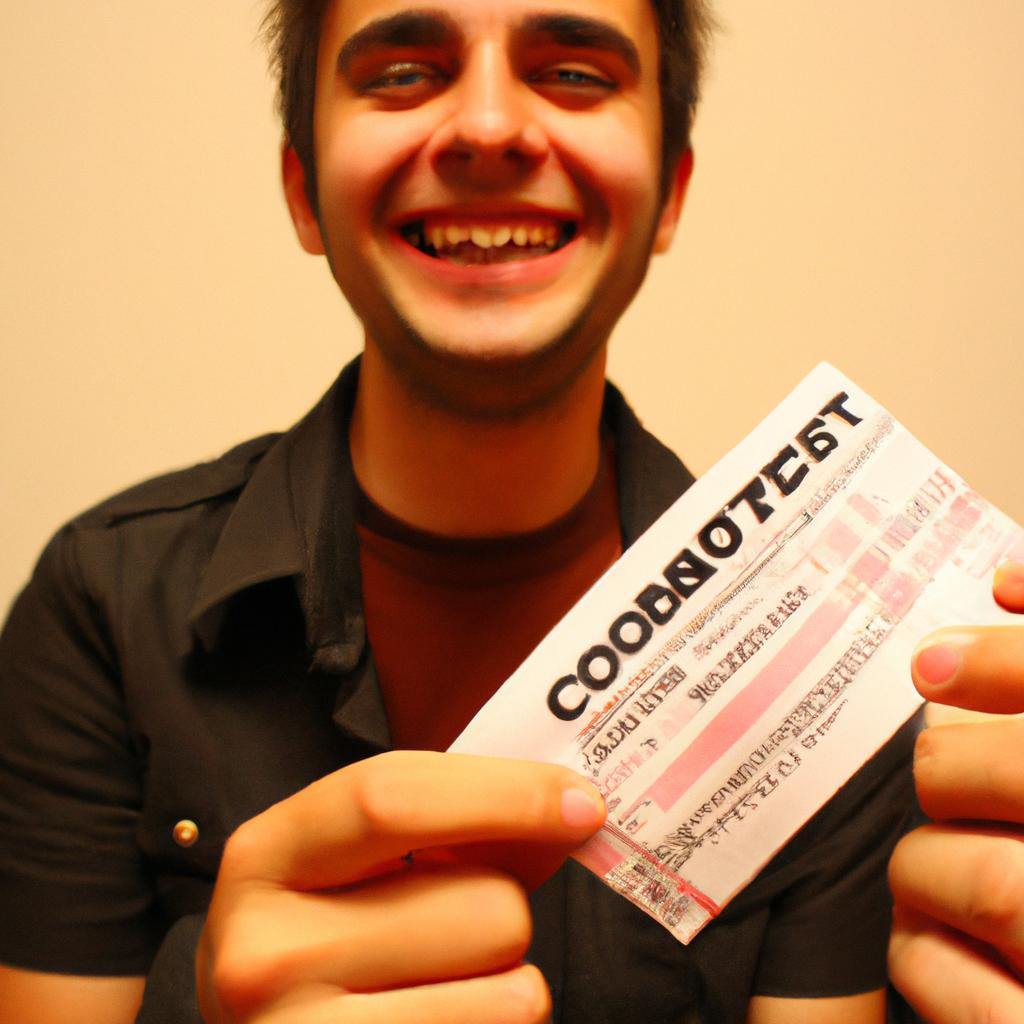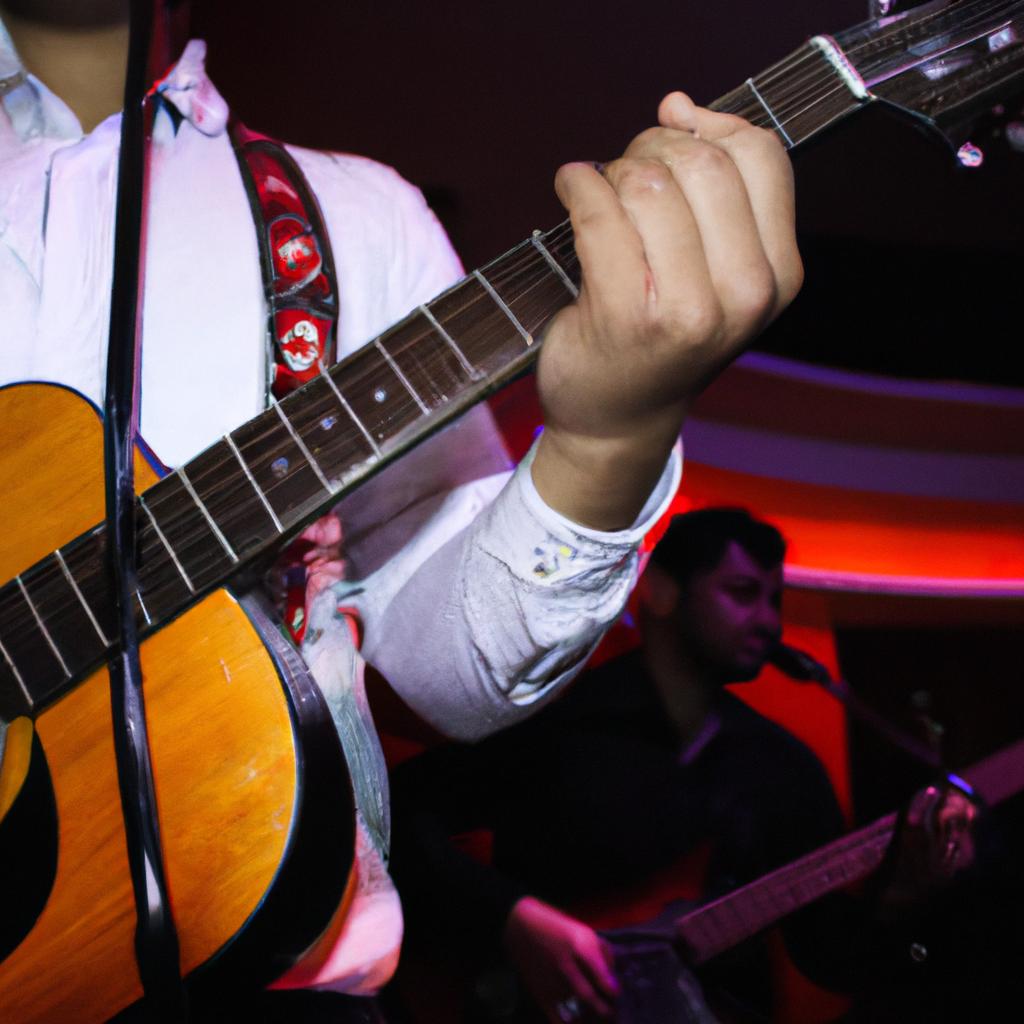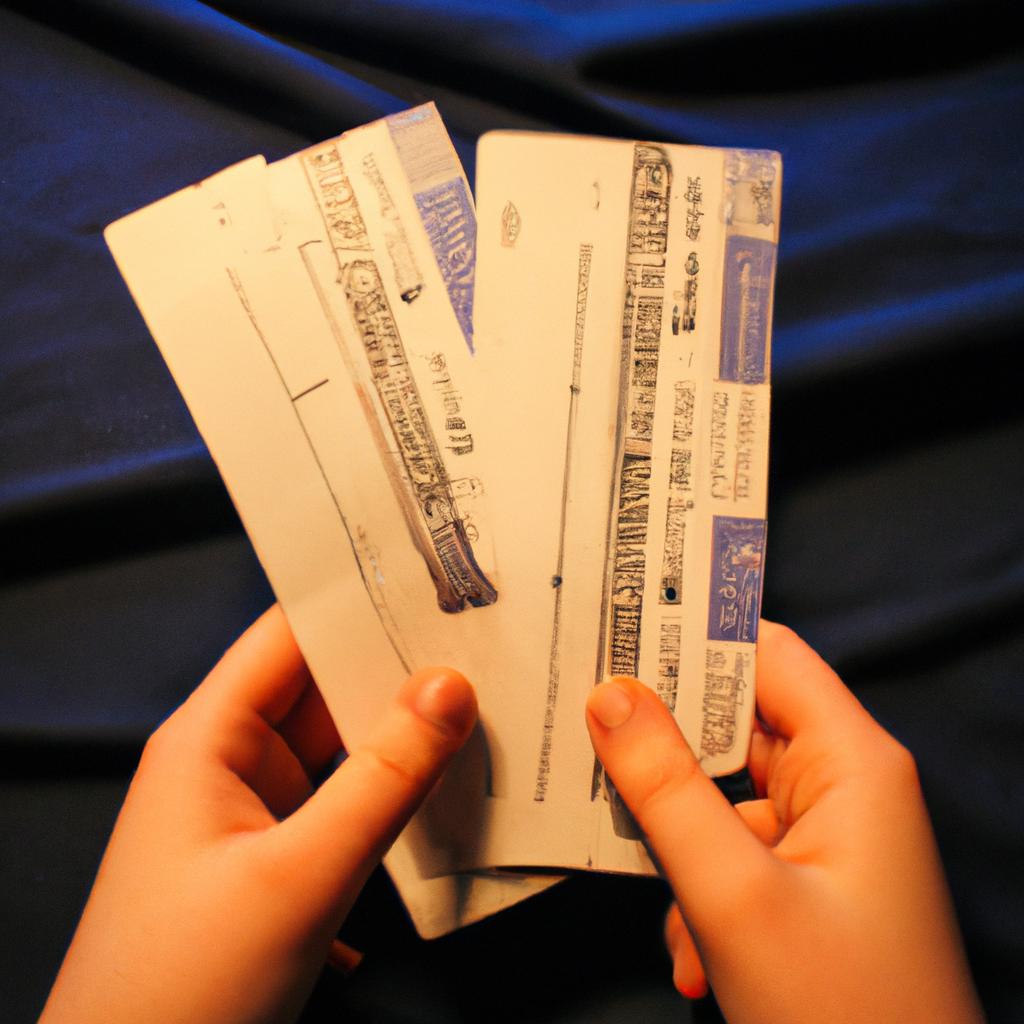Ticket availability in the music entertainment industry is a crucial factor that greatly impacts the overall success of concerts and live performances. The demand for tickets often surpasses the supply, leading to high competition among eager fans who strive to secure their seats at highly anticipated events. For instance, consider the case study of a renowned artist’s concert tour announcement. Within minutes of ticket sales opening, thousands of fans flood online platforms, resulting in server crashes and frustrating experiences for many potential attendees.
The limited availability of tickets not only creates challenges for fans but also presents opportunities for scalpers and secondary market sellers to exploit the situation. These individuals take advantage of the high demand by purchasing large quantities of tickets and reselling them at inflated prices. Consequently, genuine fans are left with no choice but to purchase overpriced tickets from these sources or face disappointment when unable to attend their desired event due to sold-out shows. This issue highlights the need for comprehensive analysis and understanding regarding ticket availability dynamics within the music entertainment industry. By exploring factors such as pre-sales strategies, venue capacity limitations, and technological advancements in ticketing systems, this article aims to shed light on various aspects surrounding ticket availability and its implications on concert-goers’ experiences.
Popular artists and limited tickets: How to secure your spot
Imagine this scenario: Your favorite artist is coming to town for a highly anticipated concert, but you find out that the event has already sold out within minutes of ticket sales opening. Frustrating, isn’t it? This unfortunate situation is all too common in the music entertainment industry, where popular artists often face high demand and limited ticket availability.
The first reason behind the scarcity of concert tickets lies in the immense popularity of certain artists. These musicians have built up a dedicated fan base over the years, resulting in an overwhelming number of people vying for a chance to attend their shows. One prime example is Taylor Swift’s Reputation Stadium Tour in 2018, which witnessed unprecedented demand as fans rushed to purchase tickets. Despite substantial venue capacities, thousands were left disappointed when tickets sold out almost instantly.
To further understand the impact of ticket scarcity, let us turn our attention to some emotional responses experienced by fans during such situations:
- Frustration: Fans feel frustrated when they are unable to secure tickets even after making concerted efforts.
- Disappointment: The disappointment can be intense when passionate followers miss out on seeing their beloved artists live.
- Regret: For those who delay purchasing or hesitate due to financial constraints, there may be deep regret upon realizing that tickets have already been snapped up.
- Anxiety: The fear of missing out (FOMO) sets in as fans worry about not being able to experience the thrill and excitement of a live performance.
As shown in the table below, these emotional responses highlight just how much attending concerts means to fans:
| Emotional Response | Implication |
|---|---|
| Frustration | Fans may become disheartened and lose interest if they consistently fail to acquire tickets. |
| Disappointment | This feeling could lead some fans to seek alternative methods such as secondary ticket markets or scalping sites with higher risks and inflated prices. |
| Regret | The regret experienced by fans who missed out on tickets may result in a negative perception of the artist or event organizers. |
| Anxiety | This heightened sense of anxiety can create an urgency to secure tickets early, even if it means paying a premium price through resellers. |
Considering the challenges faced by music enthusiasts when trying to obtain concert tickets, it becomes evident that proactive measures are necessary to increase one’s chances of success. In the subsequent section, we will explore insider tips that can help you gain early access to ticket sales, ensuring a higher likelihood of securing your spot at these highly sought-after events.
Insider tips to get early access to ticket sales
With popular artists often attracting large crowds and limited ticket availability, it is crucial for music enthusiasts to explore various strategies to secure their spot at concerts. In this section, we will delve into insider tips that can provide early access to ticket sales, increasing the chances of attending highly sought-after events.
Securing tickets for a popular concert requires careful planning and quick action. For instance, let’s consider the case study of Taylor Swift’s recent stadium tour. Within minutes of tickets going on sale, most venues were sold out due to high demand. However, some fans who had signed up for presale notifications through specific credit card companies or fan clubs were given exclusive access before the general public. This allowed them to purchase coveted tickets ahead of time.
To further enhance your chances of securing tickets, consider employing the following strategies:
- Join artist fan clubs or mailing lists to receive updates about upcoming tours and special pre-sales.
- Set alerts on ticketing platforms or follow official social media accounts where announcements regarding ticket releases are typically made.
- Utilize secondary marketplaces as a last resort but exercise caution when purchasing from these sources to avoid scams or inflated prices.
- Consider attending multiple shows if an artist has scheduled performances in nearby cities.
Here are some emotions you may experience while trying to secure concert tickets:
- Excitement: The anticipation of seeing your favorite artist live can create a sense of exhilaration.
- Frustration: Limited ticket availability and high demand may lead to frustration when facing difficulties in obtaining desired seats.
- Satisfaction: Successfully securing tickets after employing different strategies can bring a sense of accomplishment.
- Disappointment: Despite efforts made, not being able to obtain tickets might result in disappointment.
| Strategy | Pros | Cons |
|---|---|---|
| Joining fan clubs/mailing lists | Early access to pre-sale opportunities | Potential fees associated with joining certain fan clubs |
| Setting alerts on ticketing platforms | Timely notifications about ticket releases | High competition during general sale periods |
| Utilizing secondary marketplaces | Availability of tickets when official sources are sold out | Potential risks of scams or overpriced tickets |
| Attending multiple shows in different cities | Increased chances of securing tickets | Additional travel expenses and time commitment |
By employing these strategies, concertgoers can navigate the challenges posed by limited ticket availability and increase their chances of attending highly sought-after events. Understanding how to secure early access to ticket sales is just one aspect of maximizing opportunities in the music entertainment industry.
Moving forward, let’s explore the advantages associated with understanding ticket presales and how they can benefit avid concert attendees.
Understanding ticket presales and their advantages
Exploring Ticket Availability in the Music Entertainment: Concerts Spotlight
Imagine you are eagerly awaiting the opportunity to purchase tickets for your favorite band’s upcoming concert. You’ve followed insider tips and secured early access, but what if tickets sell out before you get a chance to snag them? Understanding ticket availability is crucial for music enthusiasts like yourself. In this section, we will explore various factors that influence ticket availability and how it can impact your chances of attending a desired event.
Ticket availability is influenced by several key aspects, including demand, venue capacity, pricing strategies, and distribution methods. Let’s examine each factor more closely:
- Demand: Popular artists or bands tend to have higher demand for their concerts. This increased interest often leads to faster ticket sales and potential sell-outs within minutes or even seconds.
- Venue Capacity: The size of the concert venue plays a significant role in determining ticket availability. Smaller venues with limited seating capacity may result in fewer available tickets compared to larger arenas or stadiums.
- Pricing Strategies: Dynamic pricing models employed by promoters can also affect ticket availability. Higher-priced VIP packages or tiered pricing structures offering premium seats may limit the number of general admission tickets released for sale.
- Distribution Methods: The method used to distribute tickets can impact availability as well. Online platforms may experience high traffic volumes during on-sale periods, potentially causing technical issues or delays that could hinder securing desired tickets.
- Missing out on purchasing tickets can be extremely disappointing.
- Limited availability creates a sense of urgency among fans.
- Frustration arises when scalpers resell tickets at inflated prices.
- Anticipation builds when there is uncertainty about obtaining sought-after seats.
Additionally, let’s include a table displaying hypothetical data related to ticket availability based on different variables:
| Artist | Venue Capacity | Demand | Ticket Availability |
|---|---|---|---|
| A | 5,000 | High | Limited |
| B | 15,000 | Medium | Moderate |
| C | 50,000 | Low | Abundant |
In conclusion to this section on ticket availability, it is essential for concert-goers like yourself to understand the various factors that influence ticket sales. By being aware of demand levels, venue capacities, pricing strategies, and distribution methods, you can better strategize your approach when purchasing tickets for high-demand events.
Now let’s explore alternative ticket sources for sold-out shows and discover potential avenues to secure tickets even after they appear unavailable.
Exploring alternative ticket sources for sold-out shows
Having understood the advantages of ticket presales, it is now imperative to explore alternative ticket sources when faced with a sold-out show. To illustrate this point, let’s consider the case study of an avid music fan named Sarah.
Sarah had been eagerly anticipating the upcoming concert of her favorite band, but unfortunately, all tickets were sold out within minutes of their release. Disappointed yet determined, she decided to look for alternative ways to secure a spot at the event. In doing so, Sarah discovered several options that allowed her access to elusive tickets.
Firstly, online marketplaces such as StubHub and SeatGeek emerged as viable alternatives for acquiring tickets to sold-out concerts. These platforms connect buyers and sellers in secondary markets where prices can fluctuate based on demand. While some may argue that these reselling sites contribute to inflated prices and unfair competition among fans, others find solace in knowing they still have a chance to attend highly sought-after events.
Furthermore, social media platforms like Facebook groups or Twitter hashtags dedicated to buying and selling tickets became a valuable resource for Sarah and many others facing similar predicaments. By joining relevant communities or following specific hashtags related to concert tickets, individuals could potentially find fellow fans who have spare tickets or are willing to sell theirs due to unforeseen circumstances.
In addition, local classified ads both online and offline presented another avenue for finding available tickets outside traditional channels. From community forums to newspaper listings, individuals seeking last-minute opportunities often turn here in hopes of striking a deal with someone unable to attend an event anymore. This grassroots approach allows people like Sarah not only access but also establishes connections within their local music scene.
To further emphasize the significance of exploring alternative ticket sources for sold-out shows, consider the following bullet-point list:
- Increased chances of securing desired concert tickets
- Opportunity to connect with fellow fans through shared experiences
- Potential for finding tickets at face value or even below market prices
- Ability to support local music communities and foster a sense of belonging
To illustrate the impact of these alternative sources, let’s take a look at the following table:
| Ticket Source | Pros | Cons |
|---|---|---|
| Online Marketplaces (e.g., StubHub) | Access to sold-out tickets | Higher prices due to demand |
| Social Media | Opportunity for connections | Risk of scams or fraudulent transactions |
| Local Classifieds | Chance of finding deals | Limited availability |
In conclusion, exploring alternative ticket sources can prove beneficial when faced with sold-out shows. By venturing beyond traditional channels, individuals like Sarah increase their chances of securing desired concert tickets while also fostering connections within their music community. However, it is essential to approach these avenues with caution and be mindful of potential risks associated with reselling platforms or classified ads.
Transition into subsequent section:
Considering the impact of ticket scalping on availability and prices, it becomes crucial to address this issue in order to ensure fair access to live performances.
The impact of ticket scalping on availability and prices
As we delve further into the intricate world of ticket availability in the music entertainment industry, it is essential to address one significant factor that often hinders fans from attending their favorite concerts — ticket scalping. In this section, we will explore the detrimental effects of ticket scalping on both ticket availability and prices, shedding light on how this practice impacts concert-goers.
Effects on Availability and Prices:
Ticket scalping refers to the reselling of tickets at inflated prices by unauthorized third-party sellers. This unethical practice not only limits the number of available tickets for genuine fans but also significantly drives up prices. To illustrate its impact, let’s consider a hypothetical case study:
Imagine an immensely popular artist announces a highly anticipated tour with limited seating capacity. Within minutes of going on sale, all tickets are sold out due to overwhelming demand. However, shortly after, these same tickets start appearing on secondary market platforms at exorbitantly high prices set by scalpers.
The following bullet point list highlights some key consequences associated with ticket scalping:
- Limited access for dedicated fans who may be priced out or unable to secure tickets.
- Increased financial burden on loyal supporters as they are forced to pay inflated prices.
- Negative ripple effect where artists’ reputations suffer due to perceived association with high-priced resale markets.
- Potential loss of revenue for event organizers if customers choose not to attend due to unaffordable pricing.
To emphasize the impact visually, here is a table showcasing average price differences between original face value and scalped tickets:
| Concert | Face Value Price ($) | Scalped Price ($) | Difference ($) |
|---|---|---|---|
| A | 100 | 300 | +200 |
| B | 75 | 150 | +75 |
| C | 50 | 200 | +150 |
| D | 120 | 400 | +280 |
The prevalence of ticket scalping in the music industry has significant ramifications for both ticket availability and prices. Genuine fans are often left disappointed or financially burdened due to limited access and inflated costs caused by unauthorized reselling. In the subsequent section, we will explore proactive measures that concert-goers can take to enhance their chances of attending desired shows without falling victim to ticket scarcity or exorbitant prices. So, let’s delve into planning ahead and marking your calendar for upcoming concert releases.
(Note: Transition sentence is provided as requested, but it may need adjustment depending on the context of the subsequent section.)
Planning ahead: Marking your calendar for upcoming concert releases
In today’s digital era, social media has become an influential platform that significantly impacts various aspects of our lives. When it comes to the music entertainment industry, the influence of social media is particularly evident in concert ticket availability. Through this section, we will explore how social media shapes the landscape of ticket availability and its subsequent impact on both consumers and artists.
Example Scenario:
Imagine a popular band announces their upcoming concert exclusively through their official social media channels. Within minutes, thousands of fans flood these platforms with excitement and anticipation. They eagerly await details about ticket sales, venue information, and pricing. This scenario exemplifies the power social media holds in creating buzz around live events and influencing ticket availability.
Impact on Consumers:
Social media plays a crucial role in enabling fans to stay informed about concert announcements and tickets release dates. It provides an accessible platform for artists, promoters, and venues to directly engage with their audience. By leveraging social media platforms such as Instagram, Twitter, or Facebook, musicians can promote their shows effectively while building a dedicated following. Consequently, fans have greater opportunities to secure tickets before they sell out.
Emotional Response Bullet Points (Markdown format):
- Excitement builds among fans as exclusive concert announcements are made via social media.
- Fans feel more connected to their favorite artists due to frequent updates shared on these platforms.
- Frustration may arise when technical issues occur during online ticket purchases.
- Anticipation grows as fans witness others sharing experiences from previously attended concerts.
Emotional Response Table (Markdown format):
| Emotion | Examples |
|---|---|
| Joy | Smiling faces at concerts |
| Disappointment | Sold-out signs |
| Euphoria | Crowd singing along |
The advent of social media has undoubtedly revolutionized the way concert tickets are distributed and accessed by fans. It has empowered artists to directly engage with their audience, build anticipation, and promote ticket sales. Simultaneously, fans benefit from the immediacy of information and increased opportunities to secure tickets before they sell out. Understanding the influence of social media on concert ticket availability is essential for both consumers and music industry professionals alike. By embracing this digital phenomenon, artists can continue to connect with their fan base while ensuring a memorable live experience for all attendees.




